Hire Equipment for contractors, tradespeople and the DIY
Note! All the hire equipment photos on this page are my own that I was kindly allowed to take at my local Coates hire depot. See also my page Coates Hire. for a revue of the company.
Just about everyone who works in construction from high rise to small DIY projects will need to use hire equipment sooner or later. I am not about to try and cover the huge range of tools and machinery available here, but rather I will list some general points to consider before you hire and a few dos and donts when using the equipment.
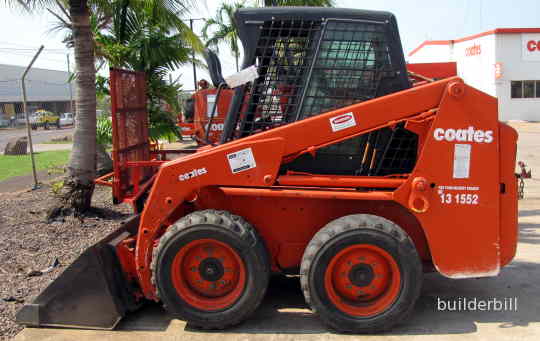 |
| Hire Equipment: A small skid steer front end loader. |
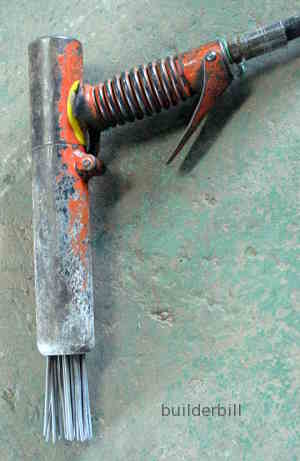 |
| Hire Equipment: A needle scabbler for chipping concrete or removing rust. |
Hire or Buy
in the past I have pondered long and hard over this question, there is far more to it than you may think. These are the sort of things that you should be considering.
To buy an item
- You must have a lot of use for it on a fairly regular basis.
- You will have substantial purchase or leasing costs.
- You will have on going maintenance and repair costs.
- Further costs are insurance and depreciation.
- You need somewhere to keep it secure.
- You have to find an accurate way of passing on these costs on to your customers, or if you are; say an owner builder, of knowing that the savings on your one off project will cover all these costs.
In return you will own your own machine and have the convenience of being able to use it any time.
To hire an item
- You pay a flat fee, either daily or longer term only if and when you need the equipment.
- There is a large range of equipment available for hire and so you have the best chance of getting the best and the safest tool to do the job.
- Construction estimates are simplified.
- You do not have money tied up in equipment when it is not in use.
- The equipment is always kept in good condition and it will comply to the current "Work Health" or OHSA requirements.
- New technology is quite often taken up by hire companies very quickly, with all the benefits it brings to the user.
- Many of the machines available for hire require the operator to hold certain qualifications. An example would be the small loader at the top of the page. Reputable hire companies can provide accredited training for many types of machinery, or they provide a hire rate that includes an operator.
- Look at the photo below of the tilt props. By being able to hire specialist items like those it is possible for a contractor to build a one off tilt slab building without an enormous lay-out on specialist equipment.
So really it all boils down to buying the equipment that you will need often and hiring the stuff that you only use from time to time.
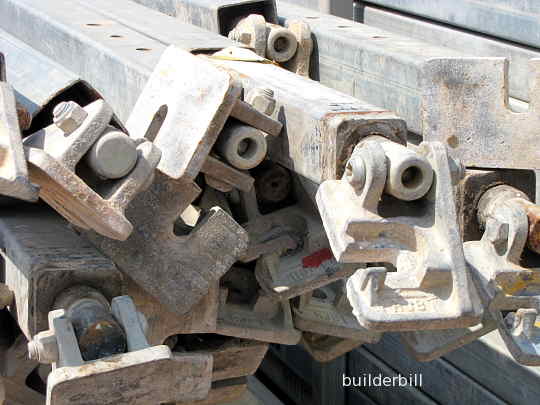 |
| Hire Equipment: Tilt up props in a hire yard to cater for the contractors who have taken up this method of construction. |
Chose the right company to deal with.
After over thirty five years as a general contractor I have come the conclusion that when hiring equipment Always get well maintained gear from a reputable company.
I have had many hired machines break down, a skid steer loader that spewed oil onto a client's driveway and I've even had a pest control guy's leaky spray head kill dozens of fish in an ornamental fish pond.
Accidents can always happen, but believe me they happen a lot less when you work with professionals. Don't take the risk.
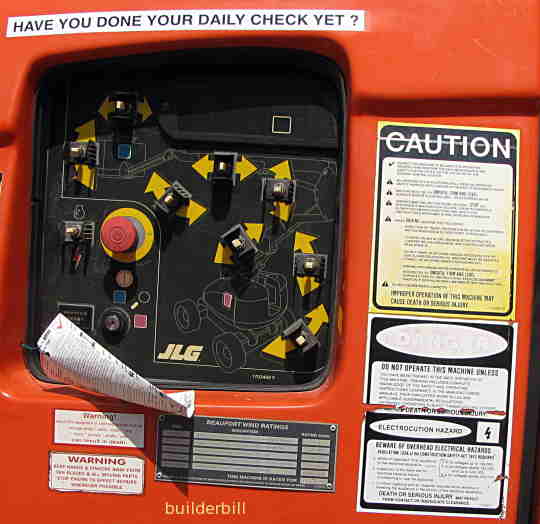 |
| Hire Equipment: Operating instructions and warning etc on a large all terrain boom lift. |
Things to do when hiring equipment.
- Talk to the guys at the depot. Be prepared to listen. They know the gear, they know what is available and what the tools can, and can not be used for. A quick example, I went in to hire a pressure cleaner a while back. The guy asked me what I was going to use it for, when I told him he told me that what I needed was a rotary "whirl-away" attachment. I had never seen one of these things, they were new to me but for a few dollars a day extra it saved me hours of work. I talk about it here.
- Someone will show you how to use the machine, and maybe start it up. Don't assume that you know how to do it. Some machines have a specific start up procedure. Ask again if you are not sure.
- If the machine has an "instructions and daily check list" like the photo above, read it first (before you flatten the battery) and do the daily checks.
- If the machine needs a licensed operator use one.
- Comply with all safety requirements including using personal protective gear.
- Chose the right tool for the job. You may be inclined to get a smaller machine that is cheaper thinking that you can still do the job in a day and save money. What invariably happens on a long tedious job is that you tend to push the machine past it's limits, the machine overheats and so do you. You may waste consumables . It is far better to get the right machine, do the work quickly and efficiently and spend the time saved doing other useful work.
- If you get any sort of problem ring the depot for assistance.
- Use only the correct consumables and accessories.
- With power tools use tagged and correct power leads. Run them through ELD boxes.
- It is your responsibiltity to keep the hire equilpment secure from theft.
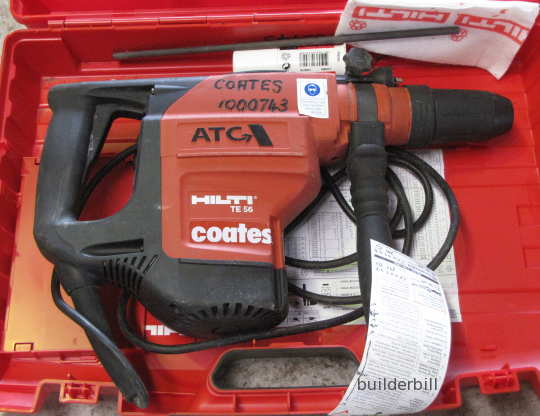 |
| Hire Equipment: Brand new and ready for work. A Hilti rotary hammer drill. |
Things Not to do when hiring equipment.
- Don't use the tool to do something that it was not designed to do. I have heard some horror stories in my time, but I am not going to repeat them here in case I give other idiots ideas.
- Don't abuse the tools, treat the tools as though they are your own.
- Never use large size electric tools at the end of ultra long leads.
- Never run long leads off a portable generator. Get the machine close to the work.





